layouts/_default/single.html:
Ep 2 - Astronomy: Hunting For Aliens
Download on Apple… Spotify… Amazon Music
About The Guest: Dr Danny Price
Dr Danny is the Project Scientist for Breakthrough Listen in Australia, and a Senior Research Fellow at the Curtin University node of the International Centre for Radio Astronomy Research (ICRAR).
He builds radio telescopes, searches for life beyond Earth, and studies enigmatic Fast Radio Bursts (FRBs). Currently, he leads Breakthrough Listen activities in Australia, and he is also working on new high-resolution, all-sky observing techniques for low-frequency telescopes.
Read articles written by Dr Danny on the SETI
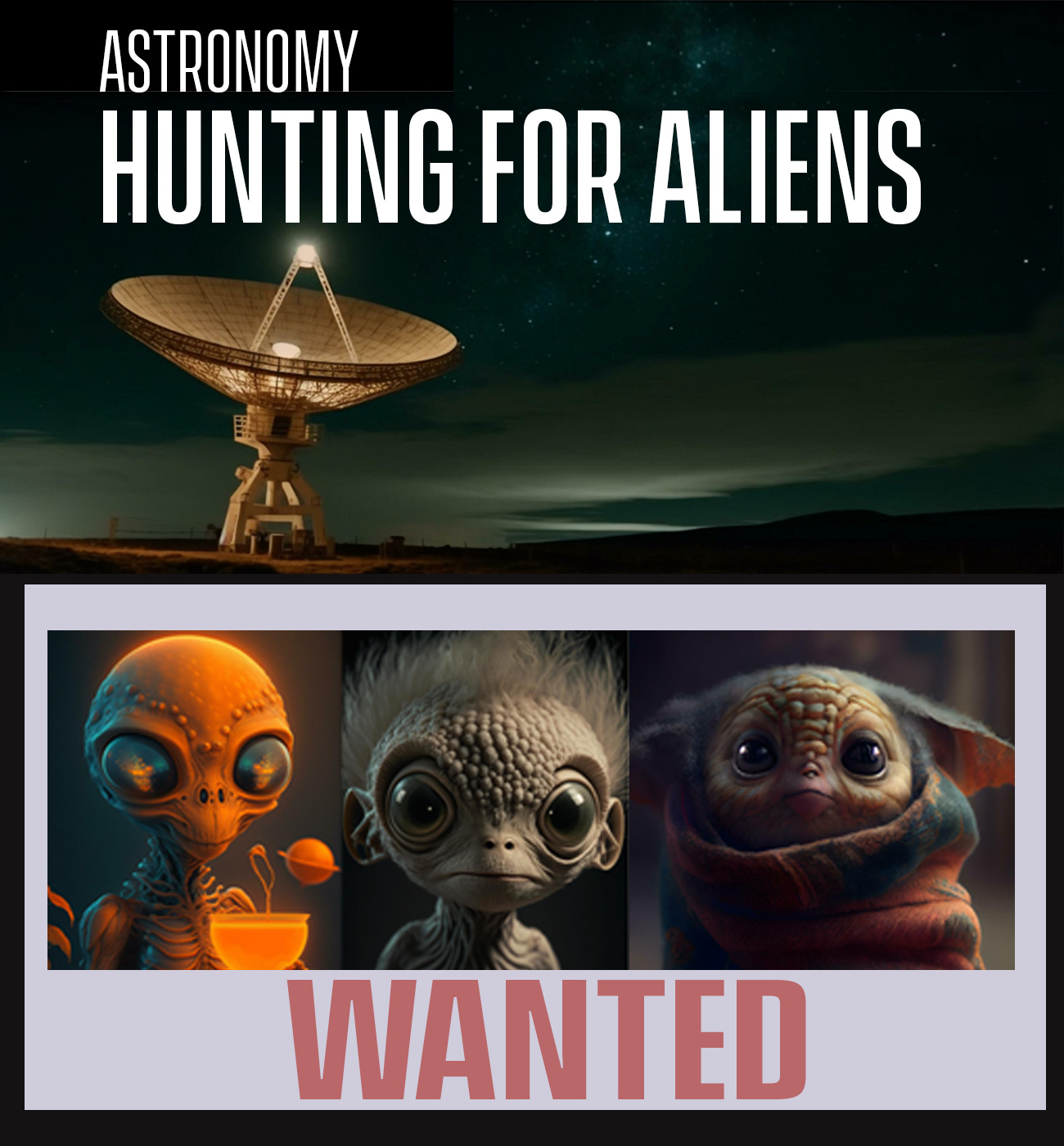
Summary of Episode:
Dr. Danny Price, an astronomer and leader of Australia’s activities in the Search for Extraterrestrial Intelligence (SETI), joins Tom and Phil to discuss the search for alien civilizations. They explore topics such as the possibility of life on other planets, how aliens might communicate, the history of SETI, and the potential impact of discovering extraterrestrial intelligence.
Dr. Danny emphasizes the importance of the search and the profound implications it could have for our understanding of the universe.
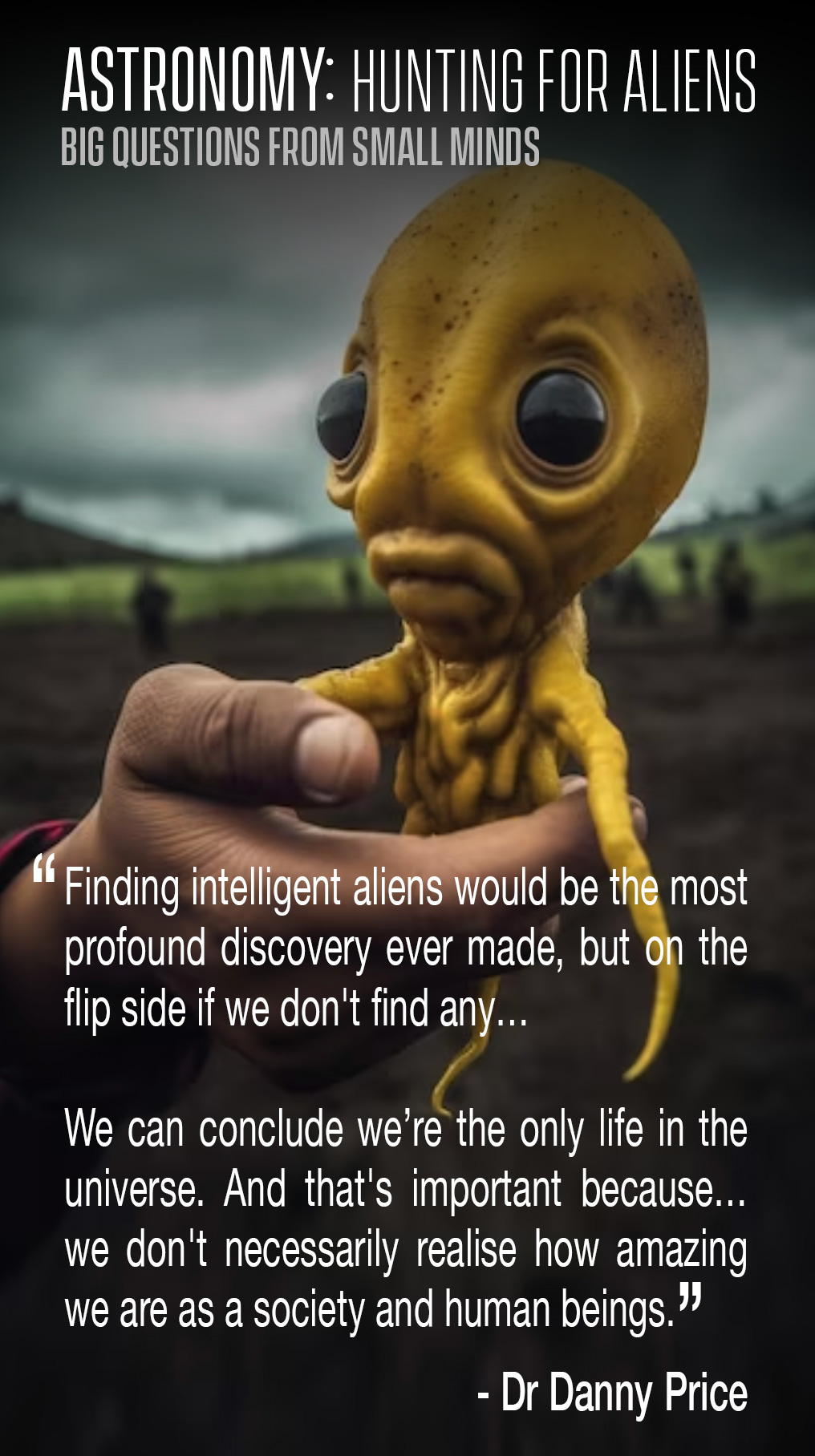
SHOW NOTES
The Quest for Extraterrestrial Intelligence
“SETI is the Search for Extraterrestrial Intelligence. And what it really is is trying to find artificial signals in astronomical data.”
SETI is a scientific endeavor that seeks to detect signs of intelligent life beyond our planet. It involves analyzing vast amounts of data collected from radio telescopes in the hope of identifying artificial signals that could indicate the presence of extraterrestrial civilizations. As Dr. Danny explains, the term “intelligence” in SETI refers to the ability to create advanced technology that we can detect.
The Existence of Aliens: A Big Unknown
“We don’t know that aliens are real. In fact, we only have one data point on that and that’s here on Earth. And we know that we exist. The big question is all that SETI is trying to answer is, is there anything else out there? And we don’t have an answer for that. The only way we’ll ever know is by looking.”
While the existence of aliens remains unknown, the conditions for life are believed to exist in other parts of the universe. Planets similar to Earth, known as exoplanets, have been discovered orbiting other stars, and the presence of water and amino acids in space suggests that the building blocks of life are widespread. However, as Dr. Danny emphasizes, the search for extraterrestrial life is ongoing, and we can only know for sure by actively searching.

Communication with Aliens: The Possibilities
“There’s only so many ways that we know of to produce a signal that can be transmitted from yourself to somebody else. You can come up with all manner of different ways. And we don’t know. It could be maybe chemical. Like, we have pheromones, dogs have pheromones.”
When it comes to communication with aliens, the possibilities are vast. Dr. Danny explains that the means of communication would depend on the environment in which the aliens live. If they inhabit a planet with an atmosphere, they might communicate through sound or even chemical signals. However, the existence of a language or a system of encoding meaning would be a key indicator of intelligence. While we can speculate on the various ways aliens might communicate, the truth remains unknown until we make contact.
The Diversity of Alien Life
“We haven’t found any aliens yet. But we can say that we can expect some things based on what kind of planet they live on.”
The appearance of aliens is a topic that has captured the imagination of many, especially children. While we don’t have concrete evidence of what aliens might look like, Dr. Danny explains that the conditions of the planet they inhabit would likely influence their physical characteristics. Factors such as gravity, temperature, and the presence of predators would shape the evolution of alien life forms. However, it is important to remember that our understanding of life is based on our own experiences, and there may be forms of life that are vastly different from what we can imagine.
The History of SETI
“SETI began in the 1960s when an astronomer called Frank Drake turned his telescope to the sky and decided to look to some nearby stars to see if there was any evidence of artificial signals.”
The history of SETI dates back to the 1960s when astronomer Frank Drake initiated the first SETI experiment, known as Project Ozma. Since then, various phases and projects have been undertaken to search for signs of extraterrestrial intelligence. Notably, Project Phoenix, led by Jill Tarter, made significant contributions to the field.
The search for intelligent life beyond Earth has captured the imagination of scientists and the public alike, leading to the inclusion of a golden phonograph record on the Voyager spacecrafts, which carries a message from humanity to potential alien civilizations.

Earth’s Noisy House Party
Earth’s radio transmissions, including television and radio broadcasts, create a significant amount of noise in the universe. Dr. Danny acknowledges that our planet would indeed sound noisy to any potential alien civilizations. However, he also points out that our transmissions have become more energy-efficient over time, resulting in a decrease in overall noise.
It is worth noting that the debate surrounding intentional transmission of signals, known as METI, is a controversial topic within the scientific community, with concerns about the potential risks and consequences of making our presence known.
The Implications of Contact
“We don’t necessarily treat the planet the way we should all the time. We don’t necessarily realize how amazing we are as a society and as human beings and plants and animals. This is really the only place where it’s ever happened. I think that’s pretty profound.”
The discovery of extraterrestrial intelligence would undoubtedly be one of the most profound and transformative moments in human history. It would confirm that we are not alone in the universe and open up a world of possibilities for scientific, philosophical, and cultural exploration. However, it would also raise important questions about our place in the cosmos and our responsibility to protect and cherish our own planet.
The implications of contact with an alien civilization are vast and would require careful consideration and collaboration among scientists, policymakers, and the global community.

The Future of SETI
“Knowing that we are not alone in the universe certainly tells us something. If we find one, as well, it probably means that there’s lots more, that there’s this entire wide universe of things out there.”
As our technology and understanding of the universe continue to advance, the future of SETI holds great promise. Dr. Danny highlights the importance of ongoing research and exploration to uncover the mysteries of the cosmos. The discovery of even a single extraterrestrial civilization would provide valuable insights into the prevalence and diversity of life in the universe. It would also inspire further scientific endeavors and fuel our curiosity to explore and understand the vast expanse beyond our own planet.
In conclusion, the search for extraterrestrial intelligence is a captivating and complex field of study that raises profound questions about our place in the universe. While we have yet to find concrete evidence of intelligent life beyond Earth, the conditions for life exist in other parts of the cosmos. The discovery of extraterrestrial civilizations would have far-reaching implications for our understanding of the universe and our own existence. As we continue to explore and search for answers, we must approach the search for extraterrestrial intelligence with curiosity, humility, and a deep appreciation for the wonders of our own planet.
TRANSCRIPT
And the answer is we don’t know because we haven’t found any aliens yet. But we can say that we can expect some things based on what kind of planet they live on. So if there was an alien living on a planet that had really, really strong gravity, we would expect it to be pretty small and squished. And if the gravity was lower, you could have much larger kind of life forms and more waif-like butterflies. So you can kind of say a few things scientifically about what you’d expect. We think if it’s too hot…
00:28
Life couldn’t exist because the molecules would just be moving around too quickly and things would just get burnt and go bad. If it was too cold, there’s probably just not enough energy for complex life to arise. Depending on what else is on the planet, if there’s predators, if they’re a predator, all of these things will change what an alien would look like. But it’s a very interesting question. Quite frankly, I look forward to seeing these long-eared aliens. They sound very cute. But maybe they use their long ears to hunt.
00:55
and slap their prey to death. That’s the thing about aliens is, technically you’re not wrong. Yet. Yet. It can be right and too otherwise. I was wondering how aliens might communicate to each other. Well, it will depend on where they’re living. If they’re living somewhere where there’s air, then they could shout.

01:24
or talk or sing. There’s only so many ways that we know of to produce a signal that can be transmitted from yourself to somebody else. You can come up with all manner of different ways and we don’t know it could be maybe chemical, you know like we have pheromones or dogs have pheromones, you know maybe they could use that. Light, you know flashing bioluminescence that kind of thing. There’s lots of different ways. The question is…
01:51
If they can communicate, if they have the means to, will they produce some kind of language or some kind of thing which encodes words and meaning? And that’s what scientists normally mean when they’re starting to talk about intelligence. So it’s possible that you could go to an alien civilization and go to their cinema, but it’s a smell cinema. And you have to sit and smell the movie and there’s like a whole narrative that goes with the smells.
02:19
I’ve actually been to synonyms like that, but I think it’s just from the patrons, not the actual movie. So Dr. Danny, going back in time, who created SETI and why? SETI began in the 1960s when an astronomer called Frank Drake turned his telescope to the sky and decided to look at some nearby stars to see if there was any evidence of artificial signals that he could find. And he did plug his telescope in and…
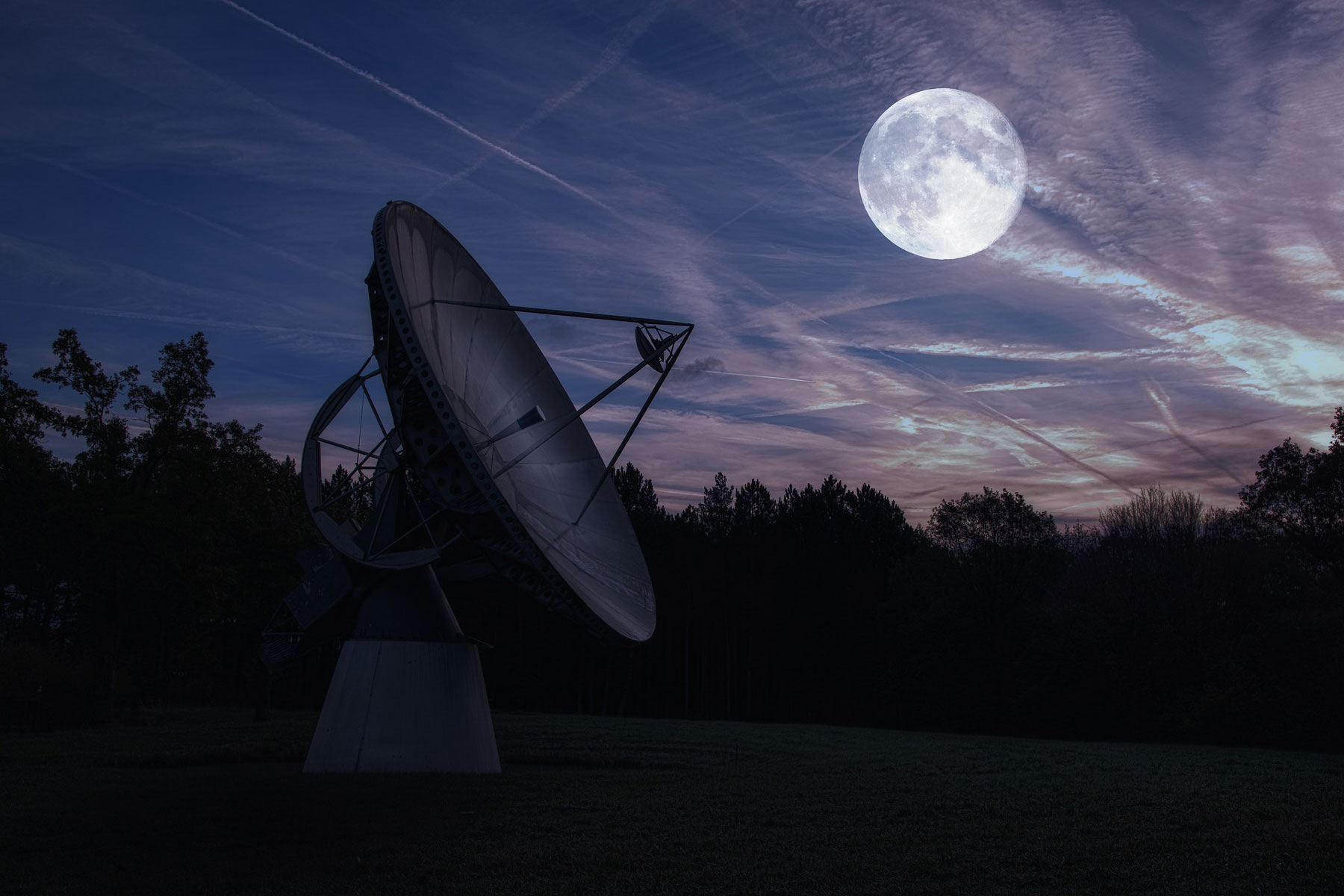
02:48
put it in through his headset and listened on his headphones. That was kind of the very first study experiment that was called Project Osmar. And since then, there’s been quite a lot of different kind of phases. There was a phase on the Allen Telescope Array called Project Phoenix that was led by Jill Tata. Jill Tata is famous because, firstly, she’s an amazing astronomer. But secondly, there was a book called Contact. And that got turned into a movie that Carl Sagan and Andrew Yan made.
03:15
That’s a beautiful movie too. Oh, actually one of my favorites. Now, I want to dive a little deeper into the history. So going back in time, in 1977.
03:31
NASA launched two spacecraft, the Voyager 1 and 2. Guidance systems online. Their job was to collect data and transmit it back to Earth. Both spaceships have flown past the outer boundary of the heliosphere in interstellar space.

03:50
Before they launched, Carl Sagan and Ed Durant placed on board both ships a golden phonograph record.
04:01
And this would be the ultimate vinyl for record collectors. Because it’s a message for intelligent aliens, which communicates the story of humans on earth with a playlist of our best stuff. For example.
04:25
Dr. Danny, how did Carl Sagan and Anne Juren decide what to put on the record? I believe there was a panel of people at Cornell University where Carl Sagan was a professor and they tried to make it as diverse as possible. There is a lot of classical music on there but I think there’s also some humpback whale songs. I think there’s a recording of Anne’s mind, like some kind of brainwave thing. And then there’s pictures and something in Morse code.
04:54
could take that Morse code and figure out that we have language, that we have the ability to make codes and things. And so there’s so much stuff on there. And there was a committee, it wasn’t just one person. They’ve tried to have as much different things on there as they can. What would you put on your playlist to send to aliens? That’s a very good question. It’s difficult because you’re not just speaking for yourself, you’re speaking for humanity.

05:23
around and make sure that wasn’t just my own. I’m a big fan of radio heads. I probably have one of those on there. Been listening to a lot of wiggles at the moment. I’m not sure I would inflict that on anyone, but they’re very popular. I could definitely see people in like one of the star systems going, I’m not sure about this country, but this big red car has me interested. I love that.
05:51
Have we ever received signals that could have been from living beings from another planet? There could be a signal in our data set that we haven’t found and analyzed. We found some signals that we thought could have been. After doing analysis, you know, it took us basically a year of looking at this one signal, we found out that it was almost certainly radio interference. In the past, so in 1977, Ohio State Big Ear Telescope, they found a signal that got called wow.
06:20
and it got called wow because it was a signal on a piece of paper that got printed out from the computer and so when it circled it and written wow, compared to the technology we have now, pretty low tech but there’s also much less interference at the time and the telescope did find something but it hasn’t been reproducible and it wasn’t strong enough evidence to say this is definitely from outer space So in space, with all the radio transmissions we make with television broadcasting

06:49
Radio broadcasting. Does Earth sound like a noisy house party? Like, you know, you’re walking down the street and you hear bt-t-t-t-t-t-t-t-t-t-t-t-t-t-t-t-t-t-t-t-t-t-t-t-t-t-t-t-t-t-t-t-t-t-t-t-t-t-t-t-t-t-t-t-t-t-t-t-t-t-t-t-t-t-t-t-t-t-t-t-t-t-t-t-t-t-t-t-t-t-t-t-t-t-t-t-t-t-t-t-t-t-t-t-t-t-t-t-t-t-t-t-t-t-t-t-
07:18
aren’t into the naughty stuff, but they love Louis Armstrong. I hope so.
07:26
In recent history we’ve probably been getting a bit quieter because we have satellites beaming things down, it’s more energy efficient, so we’ve probably gotten a bit quieter. But every now and again there are some scientists, not SETI scientists, but METI scientists, which is messaging for extraterrestrial intelligence, and that’s pretty controversial, we don’t do any of that. But METI is sending things out on purpose with really big transmitters that are directional and focused.
07:50
That’s a bit controversial because we don’t know what’s out there. They do sound like your arch nemesis is the Metty guys. It’s cordial, there’s debates. It’s mainly about whether or not we should expect to be able to detect something if we don’t transmit. Most SETI scientists, I think, are pretty anti-messaging. Certainly, you know, the late Stephen Hawking, Elon Musk said, this is bad. And I think just given Earth’s history of contact with other cultures has been terrible, so we should be careful.
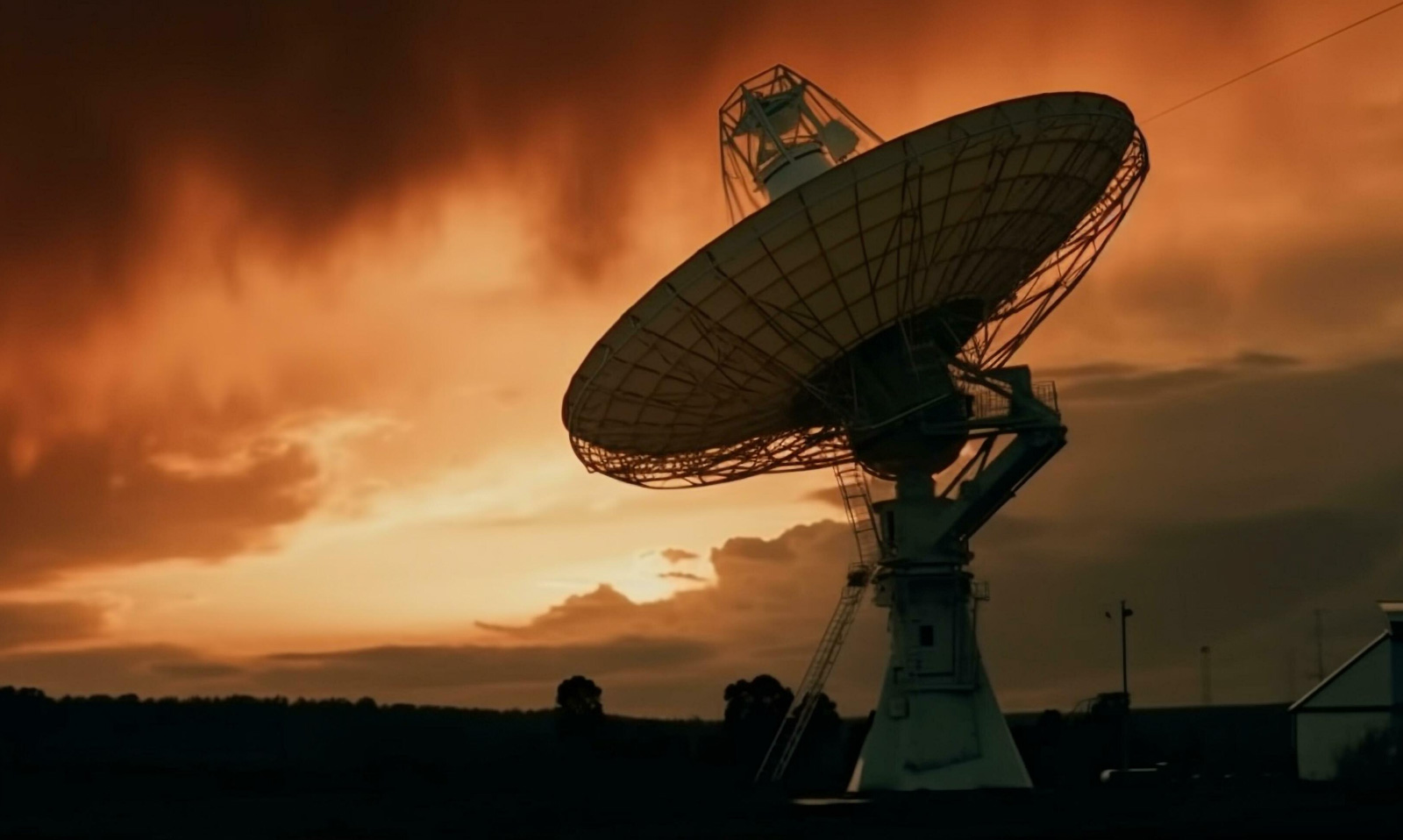
08:19
we shouldn’t expect just because something is intelligent that it’s going to be safe or that it’s going to be nice. So what you’re kind of saying is you don’t go into the jungle and say hey, I’m here because you get eaten. Yeah, I don’t disagree with that. I think we need to be a bit careful. Here on earth predators tend to have higher intelligence, at least what we call intelligence, than prey does.
08:45
But then humans we thrive because we are able to cooperate. So if you are way more advanced than us, maybe you can get to that Star Trek level of everybody’s nice. They’ve got replicators down pat and they don’t need to worry about working or food or money. They’re just like, Oh, make me a pinnacle either. Ching done. Yeah. So as long as the aliens have pinnacle, we should be safe. But isn’t the counter argument that intelligent aliens will reach the same conclusion as we have.
09:12
that sending messages into outer space is dangerous. And so they will be listening for messages and we’ll be listening for messages, but no one will be sending messages. And so how will we know there’s an alien civilization out there if no one’s sending messages? Everyone’s sneaking around in the dark. Well, you’re right. Most study scientists don’t think we should be transmitting, but one of the counterarguments is that we should, because if we’re not going to, no one else will.
09:42
counter argument is that they probably know we’re here anyway because there’s other ways you can detect Earth. The way we’ve detected most of the exoplanets is when a planet goes in front of a star. I’m moving my hands around and it doesn’t really work. So I’m guessing what you’re saying is when a planet moves in front of the star, it blocks out the star a little bit and so you see a little black spot in the telescope or in the radio frequency.
10:07
Exactly, yeah. So if you have the right orientation, when the planet goes in front of the star, it’ll block out some of the light and you’ll be able to see this very, quite imperceptible dip because stars are big and planets are small. But there is a dip in the intensity of light coming from that star and it’ll be periodic based on the orbital parameters. So you can say, well, these are the stars that would be able to see Earth. What would you say to an alien? That’s a very good question.
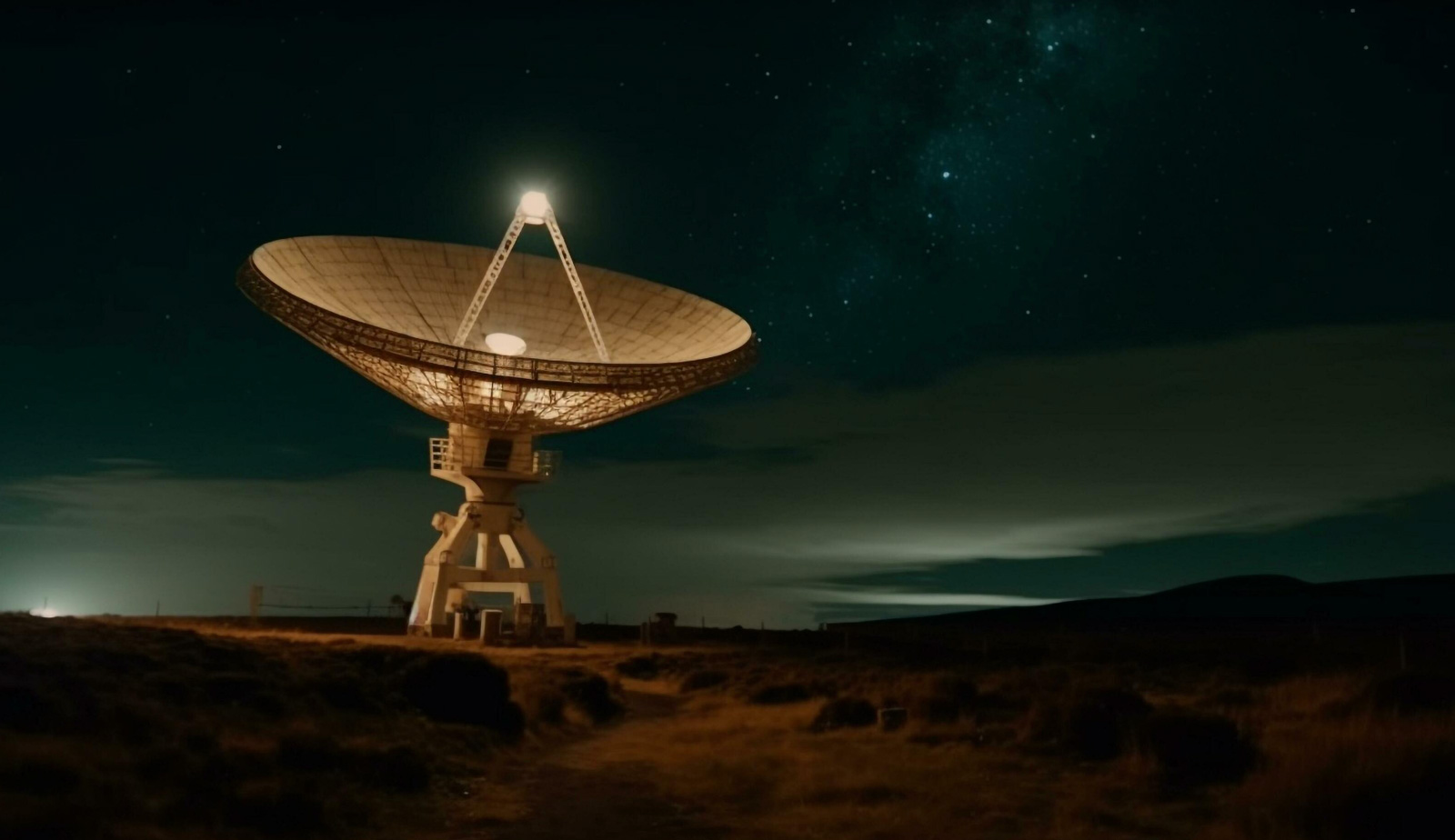
10:37
You should probably think of something to say. Normally I just start with hello or hey. Hey, if formal, you know, if you’re on Tinder or something, you just go, Hey, just swipe left on Clark from Mars. I’m married, so I don’t go on Tinder. But if you’re at work one day and you get something that says, Hello, this is Clark, who is this, does SETI have a pre thought out idea on how to respond to that, or does everyone just run around with their hands on their head screaming?
11:07
Also, since the protocols kind of a form, we also have things like Twitter and Facebook. Things can just spread incredibly quickly now. So we’ve had a few, uh, not false starts, but where we’ve found a signal and being like, Hey, this is interesting, but we needed to make sure it wasn’t ready to interference. A few days later, we got a call from the guardians saying, can you comment on this? And we’re like, Oh no, we can’t comment because we haven’t finished the analysis. And then the New York times and all the other papers reporting, but there was nothing to report because it was interference. We just hadn’t.
11:36
come to that conclusion yet. I think when we find something, we’re probably not going to have a conclusion that this is definitely a smoking gun. That I think very quickly gets out of the astronomers hands and into the hands of government leaders and the world. It’s not our decision to decide what to do there, you know, whether to attempt to communicate back or start building up our planetary defences. So you take a piece of paper and you run to the boss and he’s like, this is amazing. And he just calls up the president. They’re like, Mr. President, we have
12:05
confirmation and then that’s kind of out of your hands suddenly it’s in the politicians hands I unfortunately do not have a line to Anthony Albanese or anyone. We’ve never been contacted At least I’m not allowed to say that we’ve been contacted Oh, you heard it here first. They’re not allowed to say that Well given that Earth is really noisy aliens probably aren’t even coming here I mean Earth only has a rating of one star In space what is the Goldilocks zone?
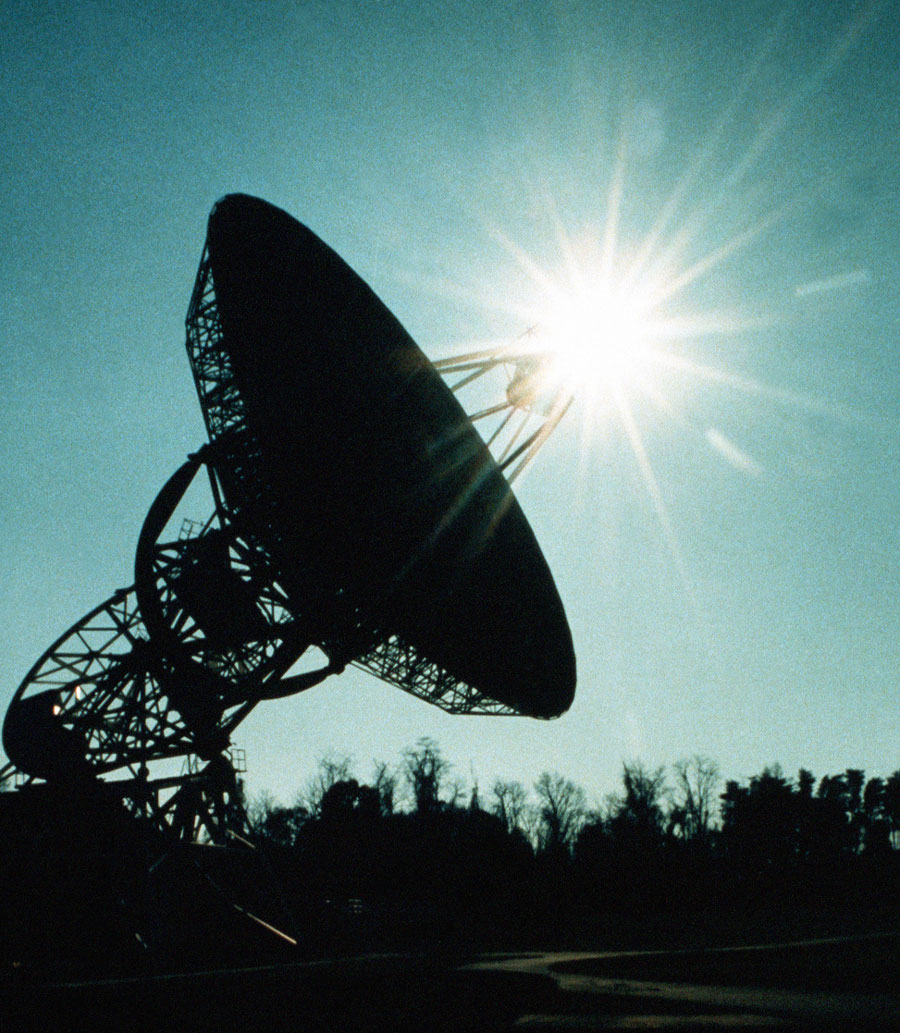
12:36
So the Kolyulog zone is also known as the habitable zone and it’s a zone where the temperature is not too cold and it’s not too hot but the temperature is just right just like a nice bowl of porridge that you’re stealing from a bear It’s kind of a bit of a contentious thing what habitable means because firstly it has to be life as we know it in completely different circumstances different life could arise but also here in the solar system that we live
13:02
There’s other planets which like Jupiter and Saturn and they have moons that go around them and those moons could actually have liquid water inside the moon even though they’re really far away just because gravity from the host planet is so strong that it pulls the moon and just if you rub your hands together really quickly I’m doing that here in the studio, I don’t know if you can hear through the microphone but when you do that you produce heat and it could be a liquid ocean inside so we may not be alone here in the solar system, there may be life
13:30
in Enceladus or on Titan or something just under the surface. Is it limiting us to think that life could only be in the same band of existence that we’re in? Like could there be an intelligence shade of the colour blue that doesn’t need heat or liquid water and could be living outside that Goldilocks zone and other solar systems? It’s difficult to completely unbiased your search from who we are as a species.
13:58
We think in particular ways and we have a particular understanding of science. We are limited by our understanding of the universe is based on our understanding of ourselves. Going to why we look for around stars and planets, we think you probably need energy and you probably need matter. Just turns out that they’re around star systems. One of the hypotheses we’re testing is, is there life as we know it out there? Right, right. We know that the conditions for life.
14:24
exist in other places but does it actually arise? Has it only arised here on Earth once? Are aliens as highly developed as us or are they less developed? We haven’t detected any aliens yet so we can’t say but the chances are they’re more. Based on we’ve only been able to use radios for communication about 100 years and the universe is about 13.7 billion years old.
14:53
So either we could be some of the first life that’s ever arisen, or we could just be late to the party. I think it’s probably likely that the kind of signals that we could detect with SETI searches would require a more technologically capable society than we are at the moment. Because if I was an alien, and I’m not. Debatable. Thank you. And I saw all these monkeys amassing weapons of mass destruction, I would stay away too.

15:22
Is that a reason they could stay away because we’re killing ourselves? We are, but for them to know that we’re killing ourselves they would have to have some evidence. One of the issues is that it’s very difficult to tell what’s happening on other planets. Here on Earth we look, we build telescopes, like the James Webb Space Telescope, which is amazing. This is a telescope that’s out in space, launched very recently, and that will be able to detect if some of these planets and other solar systems have atmospheres.
15:51
And if those atmospheres have carbon dioxide and methane and nitrogen and all the kinds of good things we have here on Earth. And some of those chemicals are produced by life and they’re not produced by geology or things that would happen on a normal planet. They’re called biosignatures as opposed to technosignatures which is what SETI looks for. So we may be able to detect biosignatures with these kind of telescopes. And you might be able to detect animals. It’s still very difficult. We’d be able to tell that the atmosphere has…
16:18
gases that couldn’t be there unless it was life, if we’re lucky. But it wouldn’t tell us that the zebras were blue. It wouldn’t tell you anything like, you know, that they’re very aggressive. And so it just does that by purely looking at the gas that’s being emitted from a planet. Yeah. So the gas, what it does is when light comes in, it’ll absorb some of it. And if you were to look through a spectrograph, you would find that there’s little holes where particular molecules stop light of that particular color from getting in or out.
16:47
And then there’s some molecules that will let me add a particular color as well. Wow, that is so interesting.
16:54
If aliens are alive, could they live on planets like Uranus and Neptune? Cause those planets are made out of gas.
17:04
That is a good question. Could they live on Uranus or Uranus, depending how you like to say it. Depends if you like to giggle. I’ll go the way I think you want it said. Uranus, it’s got lots of gas there, water, ammonia and methane. So it would smell a little bit like phytox. Excellent. Yeah. That’s, that’s our type of planet. That’s the problem with small minds people.

17:33
The amount of energy there is pretty low, so it’d be quite cold and it might be an ice or an ice that’s a little bit like a weird fluid. It’s probably difficult for life to arise there, but it’s not because it’s gas. Up in the clouds, you know, microbes can survive in the clouds. There was a theory that Carl Sagan had that life could exist in the cloud decks of Venus. Venus itself is a very horrible place. It’s got acid that rains out from the sky and it’s very hot. But up in the clouds above the acid, life could exist there.
18:04
They detected a chemical called phosphine in the cloud decks of Venus and phosphine is another really smelly gas. It’s made mainly by like slime here on Earth. There’s no natural process that doesn’t involve life to produce phosphine. So it’s possible Venus has cloud whales? Cloud whales probably less likely because gravity would pull them down and then they’d get melted. But you don’t have any actual proof the cloud whales of Venus don’t exist.
18:33
He’s trying to say cloud farts. No, I’m not. You’re a cloud fart. With Uranus, is it gas the whole way through? Like, could you just fly your spaceship straight through it? You probably wouldn’t be able to just fly through it. I mean, it’s high pressure, but it would still be counted as a gas. Neptune, I think may have a mantle and it would be a little bit like an ocean made out of carbon with like diamonds floating on it. Is that the place where rain’s diamonds? I think that’s Neptune, not Uranus.
19:03
Ah, there’s no diamonds in Uranus. I thought we were doing really well not laughing at Uranus that whole time. Well, you know what they say about Uranus. Yes, what do they say? They say it’s a terrible place to party because it’s got a terrible atmosphere.
19:24
Is there a time difference on their planet? Like, would an alien who’s my height only be three years old? I think the question is about time dilation and the crazy stuff that happens when you have really strong gravity or if you’re moving very fast. So it is possible if the gravity on a planet was very strong, uh, then you could have some weird time dilation effects, but for the person or the, the being on that planet, they would perceive time to be passing normally.
19:54
probably. If they were able to live there, I should say it’s a very, very difficult place to live. If you have those kinds of weird conditions going on.
20:17
Well, it’s terrifying to think and we don’t know the answer. But what I will say is that SETI is not trying to make contact. We’re just trying to see what’s out there. We’re just using our technology to see if we can detect other technology. Yeah. They’re not, they’re not the crazy bastards from METI. What is the benefit if we do discover there is an alien civilization that has the capacity for communication, but we’re not going to contact them.
20:47
What is the benefits in doing that? Well I think it would be the most profound discovery ever made. Knowing that we are not alone in the universe certainly tells us something. We find one as well that probably means that there’s lots more. That there’s this entire wide universe of things out there. The flip side of the coin is we don’t find anything. We actually conclude we are the only life in the universe and here on earth is the only place where life exists. And I think that’s an important…
21:13
to think about because you know we don’t necessarily treat the planet the way we should all the time. We don’t necessarily realize how amazing we are as a society and as human beings and plants and animals. This is really the only place where it’s ever happened. I think that’s pretty profound. It’s something that we should cherish. That is huge. It’s magical and beautiful and existential in whichever way you look at it. Yeah there’s fear in both directions. Or wonder and inspiration.

21:43
Wonder and inspiration at V. Ha ha ha ha ha. Danny, thank you for sharing your knowledge and telling us how you search for aliens. No worries, thanks for having me. Everything you’ve told us has been extremely fascinating. I think it’s important for a scientist to get out and actually talk to people as well and spread the word. Links to everything we talked about can be found at www.smallminds.au Keep curious people and keep asking the big questions.
22:11
Until next time, watch the skies. Big questions from small minds.